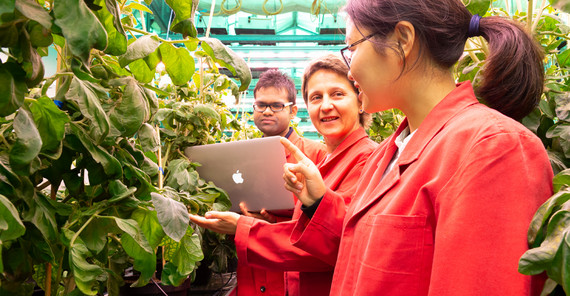Five researchers from five countries, a German university, a Dutch and an Irish company – this is what a graduate program can look like today when funded by the European Union. CropStrengthen is a European Industrial Doctorate Network of the Marie Skłodowska-Curie Program. It is a molecular biological project with the objective to increase crop strength and resistance to stress.
What stress does to plants became clear on arid fields in summer 2018: Barley, corn, and potatoes barely stood a chance after months without rain. “The urgency of our project is beyond dispute,” says Katrin Czempinski, who coordinates the graduate program CropStrengthen. “We try to identify the genes that make grains and vegetables more resistant to drought but also to excessive wetness. The most stress-tolerant plants possessing these special genes will then be bred systematically.” What gardeners and farmers achieve by patiently crossing and testing plants over several generations will be done in a fast-track procedure by using molecular biological methods. And time is of the essence: The climate is changing and crop failures are increasing worldwide.
Basic research focusing on applications
Katrin Czempinski immediately knew that she wanted to get involved in this project. Its international approach as well as collaborating with operators in the industry piqued her interest. She underestimated, however, how much her own tolerance for stress would be required. The PhD students came from India, Pakistan, China, and Colombia. Two of them were employed by the participating companies BioAtlantis Ltd. in Ireland and Enza Zaden Research and Development B.V. in the Netherlands, and the other three at the University of Potsdam. During their doctoral studies, all early-stage researchers had to conduct research on-site at the industrial partners for 18 months. “This was one of the program’s conditions,” Czempinski explains, who did not know at the start of the project three years ago what was involved in obtaining residence and work permits for five non-Europeans in three European countries, organizing constant changes of residence, and resolving insurance issues. She sometimes thought she would never do this again. Deadlines, taxes, approvals – nothing went together. At the same time, the experiments in the Potsdam greenhouses operated under their own laws. “Plant growth and experimental procedures don’t care about residence regulations,” says the doctor of biotechnology, who is familiar with the constraints of scientific work from her own experience. In retrospect, she is astonished how things eventually fell into place. “I would not have managed without the help of the Welcome Center and the university’s HR department,” she is sure. With patience and creativity, they found new answers to even the most complicated questions. Only in this way were the PhD students able to take advantage of the program’s special opportunities and to relate their basic research topics to those of the industry. This was an important experience that will help them to find the right career path after graduation.
Biostimulants increase drought tolerance
All five PhD students are now about to complete their doctoral studies. They were invited by Prof. Bernd Müller-Röber – a molecular biologist and scientific coordinator of the project – to present their results in a poster session at the international Plant Stress Symposium in November 2018. The scientific committee of the symposium selected PhD researcher Lorena Romero Prada to give a talk. She reported on her analysis of a stress-tolerant wild tomato from the Andes. “These exciting results were extensively discussed,” says Müller-Röber. Over 50 experienced researchers as well as many young ones came to Potsdam from 16 countries to discuss the current state of research.
The projects of the graduate program provided important data for a better understanding of the response of model and crop plants to environmental stress and adaptation. One of the most notable results is the discovery that certain biostimulants made from brown algae significantly improve the resilience to drought stress. “Several genes with similar functions are involved in the model plant Arabidopsis thaliana and the cultivated plant tomato. How exactly the biostimulants activate the genes is still unknown.”
That the biostimulants used increase the drought tolerance of plants is in itself an important finding. In the future, such products will likely be used to cultivate other plants that need to be protected against drought, but this must still be tested in detail, as the molecular biologist explains. “It is also important that we learn more about the genes that provide such protection by looking at the effect of biostimulants. In the future, this knowledge can be used in breeding.” Initially, this will require an in-depth analysis of the identified genes, the cellular signaling networks, and molecular mechanisms. Promising candidates that improve stress tolerance when influencing and changing their gene activities would then serve as new breeding markers to cross this trait into new varieties, says Müller-Röber. “In the medium term, it could be particularly interesting to breed our crops so that they react even better to biostimulants.”
THE PROJECT
CropStrengthen is a European Industrial Doctorate Network funded by the Marie Składowska-Curie Program of the European Union. It aims to increase crop strength and resistance to stress by developing new breeding methods and identifying the relevant genes. Participants: University of Potsdam, Department of Molecular Biology, BioAtlantis Ltd., Ireland, and Enza Zaden Beheer B.V., the Netherlands.
This Video introduces the involved researches and provides an overview on research approaches and results.
THE RESEARCHERS
Prof. Bernd Müller-Röber studied biology and philosophy in Tübingen and Marburg. Since 2000, he has been Professor of Molecular Biology at the University of Potsdam.
bmruuni-potsdampde
Dr. Katrin Czempinski is a biotechnologist and coordinator of the European Graduate Program CropStrengthen at the Institute of Biochemistry and Biology.
katrin.czempinskiuuni-potsdampde
Text: Antje Horn-Conrad
Translation: Susanne Voigt
Published online by: Marieke Bäumer
Contact to the online editorial office: onlineredaktionuuni-potsdampde

